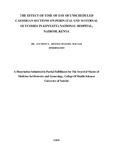| dc.contributor.author | Makori, Anching'a A | |
| dc.date.accessioned | 2016-04-21T06:36:17Z | |
| dc.date.available | 2016-04-21T06:36:17Z | |
| dc.date.issued | 2015 | |
| dc.identifier.uri | http://hdl.handle.net/11295/94467 | |
| dc.description.abstract | Introduction: Large multicenter studies done in teaching hospitals in USA and Europe
showed no important differences in maternal and neonatal morbidity after unscheduled
cesarean section delivery according to work shift. There were however no studies which had
been done at Kenyatta National Hospital (KNH).
Objectives: The objective of the study was to compare the 72 hour post delivery maternal
and neonatal outcomes among patients undergoing unscheduled cesarean section during the
night and day shifts in KNH.
Study Design: A prospective cohort study in which the exposed group was those patients
who had undergone unscheduled cesarean section during the night while the control group
was those patients who had undergone unscheduled cesarean section during the day was
conducted between February and April 2015 at Kenyatta National Hospital (KNH). The
incidence of poor maternal and neonatal outcomes within the first 72 hours post cesarean
section was compared between the two groups.
Study Population: This comprised all postnatal mothers who had undergone unscheduled
cesarean section at Kenyatta National Hospital and were within 72hours post operation in the
postnatal wards, PACU and Intensive Care Unit.
Results: Between the months of February 26th and April 2nd 2015, a total of 240 patients
undergoing unscheduled caesarean sections at the Kenyatta National Hospital were recruited
into the study including 120(50%) patients who had an operation performed during the night
shift and 120(50%) during the day shift. Data was collected prospectively. There was no
significant difference in the socio-demographic characteristics of patients according to shifts.
Most procedures were conducted under regional anesthesia with no significant differences
between day and night surgeries. The leading indications for unscheduled CS during the day
and night were: NRFS, obstructed labor and elective CS converted to emergency CS in that
order. Conversion of Elective Cesarean section to Emergency CS was significantly more
common during the night compared to during daytime. Poor maternal and neonatal outcomes
did not show a significant difference depending on time of surgery.
xii
Conclusion: The study showed that there was no significant difference in pregnancy
outcomes between unscheduled cesarean section done during the day compared to those done
during the night.
Recommendations: Regular clinical audits should be performed and interventions carried
out promptly with the aim of reducing poor pregnancy outcomes, patients scheduled for
elective cesarean section should be operated on as planned to reduce the high numbers of
unscheduled cesarean section done at night due to conversion of these elective cases to
emergency cases and that Kenyatta National Hospital should continue with the current
schedule in terms of resource provision in both shifts since it has been shown not influence
adverse pregnancy outcomes. | en_US |
| dc.language.iso | en | en_US |
| dc.publisher | University of Nairobi | en_US |
| dc.subject | unscheduled caeserian sections on perinatal and maternal | en_US |
| dc.title | The effect of time of day of unscheduled caeserian sections on perinatal and maternal outcomes in Kenyatta national hospital, Nairobi, Kenya | en_US |
| dc.type | Thesis | en_US |
| dc.description.department | a
Department of Psychiatry, University of Nairobi, ; bDepartment of Mental Health, School of Medicine,
Moi University, Eldoret, Kenya | |

